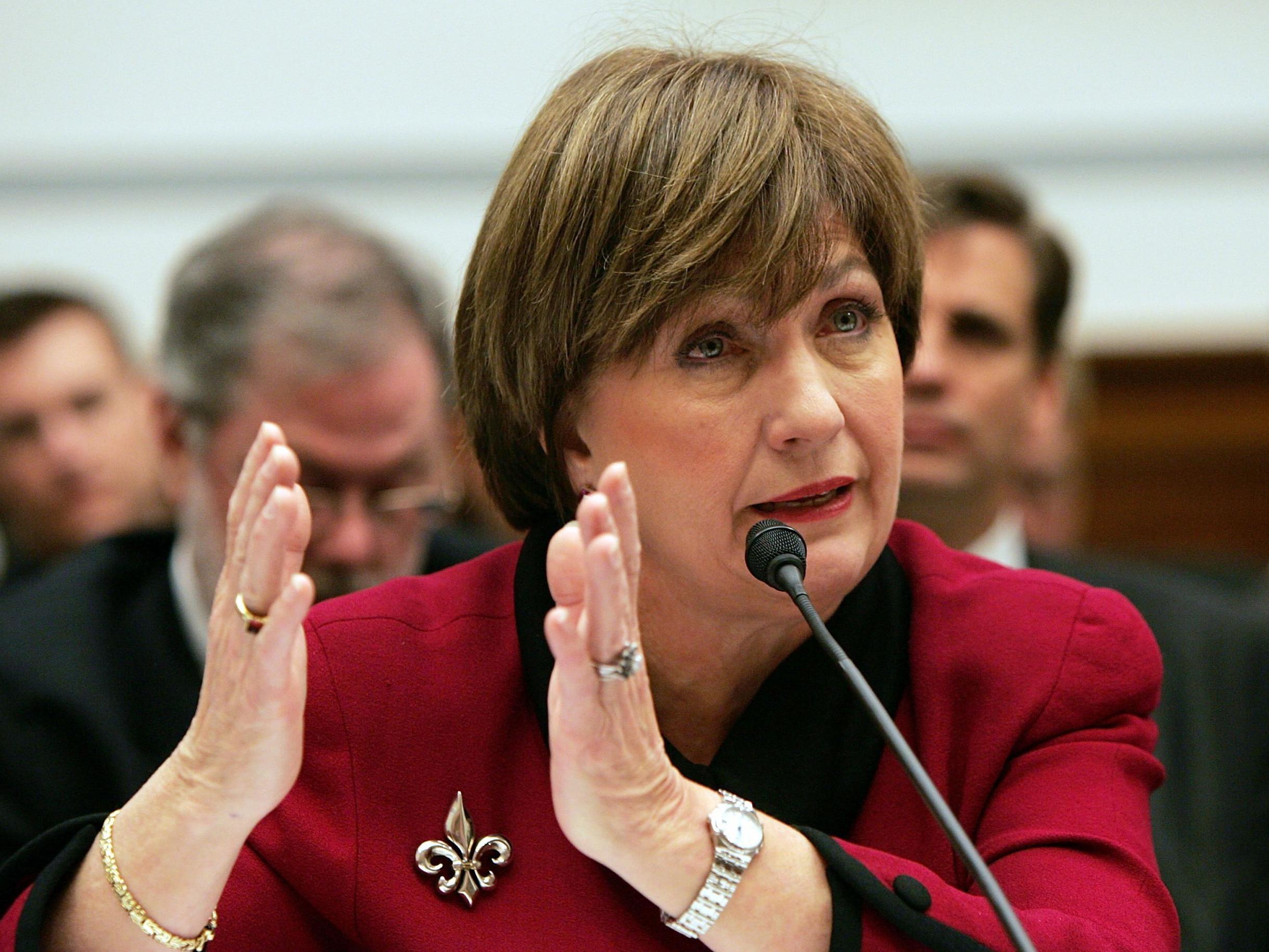Kathleen Blanco: Louisiana’s first female governor who led the state through the devastation of Katrina
Her progressive agenda was disrupted and overshadowed by two deadly storms in 2005

As the state’s first female governor, Kathleen Blanco led Louisiana through one of the most turbulent periods in its history when, just 20 months into her term in office, it was hit by not one but two devastating storms: Hurricanes Katrina and Rita. New Orleans was submerged, hundreds of thousands were displaced, more than 1,500 people died. And Blanco found herself at the centre of a political row that threatened to overshadow all her achievements.
Blanco, who has died aged 76, was born Kathleen Babineaux in New Iberia, Louisiana, to Lucille (nee Fremin) and Louis Babineaux. She was raised in the Cajun town of Coteau and attended a Catholic girls’ school before heading to the University of Louisiana, at Lafayette, to study business education. Upon graduating, she taught business at Breaux Bridge High School until she married Raymond Blanco, a football coach and teacher, in 1964. They had six children and for 15 years Blanco devoted herself to their upbringing. Returning to her career, Blanco set up Coteau Consultants, a market research consultancy, with her husband and worked as a district manager for the US Department of Commerce.
A lifelong Democrat, Blanco was first elected to public office in 1983, when she became the first female legislator in the city of Lafayette. She served five years in the Louisiana House of Representatives before she was elected to the Louisiana Public Service Commission – again the first woman in the role. She would later become the PSC’s first female chair. After that, she served eight years as lieutenant governor. It was not a period without personal challenges: in 1997 her youngest son Ben was killed in an industrial accident.
Blanco had briefly joined the race to be state governor in 1991 but dropped out before the vote. She returned triumphant in 2003. Upon her election (true to her Cajun roots, she took her January 2004 oath in both English and French), Blanco set out her priorities: education, affordable healthcare and economic development. In an effort to forge new trading relations for the state, Blanco visited China, Japan and Taiwan. She also made a controversial trip to Cuba, where she met with President Fidel Castro.
However, in 2005, Blanco’s priorities were altered dramatically when Louisiana was hit by two hurricanes in the space of a month. First came Hurricane Katrina, which caused devastation in the New Orleans region. The world watched in horror as New Orleans’ levee system failed and thousands of the city’s residents were left sitting on rooftops to await evacuation. Then in September came Hurricane Rita, devastating the state’s southwestern coast.
It was an enormous challenge and Blanco’s administration immediately came under fire for the speed of its response. Before Katrina, Blanco had claimed at a media briefing: “I believe we are prepared. That’s the one thing that I’ve always been able to brag about.” But the hurricane’s destruction outstripped anything anyone had expected. Blanco’s request for federal aid grew from $9m to $130m in a matter of days. She oversaw the evacuation of 60,000 people. Meanwhile the White House was quick to blame Blanco’s team for the failures of the emergency operation. While reports of looting and lawlessness hit the news, President George W Bush declared the situation to be a state of emergency and put into action the largest domestic deployment of the US armed forces since the Civil War.
Ultimately, Bush would agree there had been failures in emergency planning at a federal level while Blanco said, “At the state level, we must take a careful look at what went wrong and make sure it never happens again. The buck stops here, and as your governor, I take full responsibility.” But as the flood waters receded, Blanco’s battle to get federal support to rebuild her state had only just begun.
Post-Katrina, Blanco got back to working on the aims she’d set out at the beginning of her term. She championed education, substantially increasing the funding of colleges and raising public school teacher pay. She oversaw the state takeover of failing public schools, raising standards for thousands of New Orleans’ most vulnerable students. However, Blanco’s time as governor was also marked by a shift towards more partisan politics.
As her term drew to a close, delays in federal compensation for those displaced by Katrina were eroding Blanco’s popularity. In 2007, she repeatedly questioned whether partisanship was behind the White House’s slow response in Louisiana, a Democrat state, while Mississippi, headed by a Republican, seemed to get more help. Unable to get a satisfying answer, Blanco chose not to stand for re-election. Bobby Jindal, the Republican candidate Blanco had beaten in 2004, took her place. However, Blanco did not step away from politics altogether. In her retirement, she lent her support to John Bel Edwards, the Democrat candidate who became Louisiana’s state governor in 2016.
In 2011 Blanco was diagnosed with a rare ocular melanoma. Having been declared in remission, in 2017 Blanco was told that the cancer had returned and spread to her liver, and was considered inoperable.
Her funeral was preceded by three days of public mourning, testament to the enduring popularity of the woman who had promised “to be the voice of the voiceless, to shape the rising tide that lifts all boats, to advocate for policies and changes that make good common sense, and to have a positive impact on the lives of all people”.
Blanco is survived by her husband and five children.
Kathleen Blanco, former governor of Louisiana, born 15 December 1942, died 18 August 2019
Join our commenting forum
Join thought-provoking conversations, follow other Independent readers and see their replies
Comments
Bookmark popover
Removed from bookmarks